- Home
- Robert Muchamore
The Escape Page 5
The Escape Read online
Page 5
And what would happen if the Germans got him, rather than the French police? Then again, would it be any better if he waited around until the Germans reached the orphanage? And maybe if he got far enough south they’d never get him at all. But then where would he go? Would there be anyone to give him food and put a roof over his head once the money ran out?
Marc stepped towards the larder cupboard. He opened the door and stared at the old salt tin with the director’s savings inside, as every question he asked himself spawned two more. He knew he’d never be able to answer all – or even most – of them. He realised there was only one question that really mattered:
Do I have the guts to run away, or am I all mouth like Lanier says I am?
Marc thought about fate. Perhaps god had left the bicycle and money as a temptation, to see if he would steal them. Or, maybe god wanted him to take the decision to leave? He decided to reach into the tin and pull out a single coin without looking. If it came up heads when he opened his palm he would leave. If it came up tails he would stay.
It seemed stupid, but it was the only plan Marc had. He dashed back to the door of the cottage for a final look to make sure nobody was coming. Then he unscrewed the tin and grabbed a coin blindly. He could hardly bear to open his fist.
Marc trembled as he released his fingers and saw the buckled two-cent piece with the face of Liberty staring at him. He reached into the tin and grabbed the rest of the director’s savings.
CHAPTER EIGHT
Mr Clarke drove quickly with Rosie in the front and Paul in the back with the luggage piled around him. Concerned that the police were coming, or that another German agent might be waiting outside, they hadn’t wasted time packing the boot.
‘I owe the pair of you an apology,’ Clarke said, once they’d caught their breath and put a couple of kilometres between themselves and the apartment. ‘You never should have had to see that. If it was up to me you’d be safe and sound in England right now. Imperial Wireless offered to help pay your school fees after your mother died, but because she was French she never liked the idea of you two going to an English boarding school.’
Paul was in shock, and struggling to reconcile his father’s warm persona with his calculating behaviour back at the apartment. ‘So who was that German?’ he asked.
‘Abwehr – German secret service.’
‘But Mujard said the French police came too,’ Rosie noted.
‘No,’ Clarke said, shaking his head as the Citroën turned right into a cobbled alleyway. It was a poor neighbourhood and strands of washing hung from the apartment blocks on either side of them. ‘German agents have been operating in Paris for years, but since the invasion they’ve become quite brazen. They’ve taken to disguising themselves as police officers and their enemies have been disappearing, either shot or kidnapped and smuggled out for interrogation. Henderson reckons the French police are turning a blind eye.’
‘Why?’ Paul asked.
‘A lot of police officers have gone south. Those who’ve stayed behind hope to be working for the Germans in a few weeks’ time and have no intention of antagonising their future bosses.’
‘Who is this Henderson?’ Rosie asked. ‘A spy?’
Mr Clarke nodded. ‘He works for a branch of naval intelligence called the Espionage Research Unit. It’s a small department that specialises in unearthing enemy technology.’
‘And you work as a spy too?’
Clarke laughed at the thought. ‘I went on an intelligence corps training course back when I was in the navy, but it’s certainly not my day job. I first met Henderson about four years ago. As well as standard radios like we have in the apartment, Imperial Wireless makes specialist equipment like radios for military aircraft and ships, directional beacons, scrambler systems and such like.
‘I’ve been selling that equipment into France for seventeen years and over that time I’ve got to know everyone in the business – from the officers in the French naval procurement office, all the way down to the admin staff in our rivals’ sales offices.
‘Every few months Henderson and I meet for a drink. He’s always interested in the latest technical developments from our rivals and—’
Clarke had to stop speaking because he’d turned into a road that was blocked off by wooden barriers. They were less than a hundred metres away from a major railway station and the courtyard in front of it was jammed with people. But the steps leading inside were cordoned off and soldiers stood at wrought-iron gates with their guns poised.
A flat-capped policeman strode importantly towards the car as Mr Clarke wound down his window.
‘Do you have reservations for a train?’ he asked curtly.
Clarke shook his head. ‘I’m just trying to get across town.’
The officer shrugged before dramatically pointing him back the way he’d come. ‘No access. Leave at once!’
‘Blast,’ Clarke said, as the front tyre scraped the kerb. ‘Rosie, pull the map from under the seat and work out another way out of the city.’
After a few hundred metres Mr Clarke pulled up outside a laundry and leaned across to study the map his daughter had unfurled in her lap. He’d travelled all over France, persuading department stores to stock Imperial Wireless radios, so he knew the roads well and it took less than half a minute to familiarise himself with an alternative route.
Once he was back on roads he knew, Mr Clarke continued his story.
‘Late last year I got wind of a new transceiver – that’s a radio set that transmits and receives – designed and built by a Frenchman called Luc Mannstein. He runs a family company that has made very expensive and very beautiful watches for more than two hundred years. But Mannstein is also a keen radio amateur. Like a lot of hobbyists he’d built his own radio equipment and aerials that could transmit all over the world; but things only got interesting when he decided to apply his skills as a watchmaker to the production of a miniature set.
‘Mannstein has designed and built a powerful and robust radio transceiver that is less than a third of the weight of anything we make at IWC. Even with an aerial, a battery and a Morse key or microphone it can be comfortably carried in a leather pouch strapped to your chest. At present there are only a few hand-built prototypes in existence, but if the design could be mass produced it would revolutionise communications.’
Mr Clarke began to sound like his usual self again as he broke into a salesman’s patter. ‘I mean, imagine a radio small and light enough to be carried by every soldier on the battlefield, or every police officer on his beat. Instant communication! Car drivers could radio one another to announce accidents or traffic jams. Some day it’s even possible that husbands could radio their wives in the kitchen to say that they’re on their way home from work.’
‘And that’s what all these documents are, isn’t it?’ Paul said, as he eyed the stack of papers on the seat beside him. ‘Plans for Mannstein’s miniature transceiver.’
‘That’s right,’ Mr Clarke said. ‘You see, in the longer term the compact radio might be a mass-market product, but the Espionage Research Unit is interested in its covert applications. If you’re working as a spy behind enemy lines you need a transceiver that is small, light and tough.
‘As soon as I found out about Mannstein’s miniature set I told my bosses at IWC. They made Mannstein an offer to buy into his company and build a workshop in which to begin producing radios. Unfortunately IWC has been hammered by American imports and we’ve had a few tough years financially. Our offer was far from spectacular and Mannstein rejected it.
‘By this time Henderson had spoken to the British Government about the potential of Mannstein’s design and he was trying to get some money together to up the bid. Unfortunately the whole thing got bogged down in red tape just as the Germans entered the bidding.
‘The Nazis’ attitude is to spend whatever it takes to acquire the best technology available. So while the French Government totally ignored the situation and the British fudged ov
er whether it was right to interfere in the free market, the Germans came in with a gold-plated offer: more money, a brand new factory in Germany and a state of the art research facility where Mannstein could refine his technology.
‘Once the Germans were involved the British upped their bid, but it still wasn’t a patch on the German offer. Mannstein was all set to sign a deal and move his company to Germany, but at the last moment France declared war and the whole thing collapsed.’
‘So he signed the deal with Britain?’
Mr Clarke shook his head. ‘The French wouldn’t allow that either. It all got bogged down in a row over export licences. They even confiscated Mannstein’s passport in case he tried to leave the country. Mannstein’s company didn’t have enough money to mass produce the radio by itself and the whole project has been in limbo for nine months.
‘When the success of the German invasion shocked the hell out of everyone, I spoke to Henderson again and we set up an emergency meeting in Mannstein’s office. We were going to offer him safe passage to Britain, but when I got there I walked into the reception and bumped into our German friend from the apartment, along with two of his colleagues.
‘Mannstein wasn’t too pleased to see us. He didn’t say much, but I got the impression that he thought we’d messed him around too much in the past and he would be happy to sit back and wait for the Germans to invade so that he could work with them.
‘When I left with Henderson I mentioned that I knew a young salesman who worked in Mannstein’s office – I’d put in a good word for him back when I was on friendly terms with Mannstein and helped him land the job. As luck would have it the young fellow is a Jew and he was desperate to head south before the Boche arrived. I caught up with him just before he quit and left town with his family.
‘He let me copy his keys to Mannstein’s office and workshop. I got up at three a.m. this morning and drove over there. The security system was virtually non-existent, but unfortunately our German friends were expecting us. As I was coming back to my car with the documents they jumped me. Luckily I had my knife at the ready and I managed to stab one and knock the other out.’
Rosie and Paul shared an incredulous glance. They were both impressed and shocked by their father’s story. With his flamboyant dress and soft manner he’d never struck them as the type of man who kept a knife at the ready.
‘If I’d done things by the book I would have killed them both,’ Mr Clarke went on. ‘But I didn’t, which was a damned fool thing because they knew who I was and that almost led to them killing all three of us back in the apartment.’
As Mr Clarke said this he turned and smiled at his daughter. ‘But you saved us, sweetheart.’
Rosie shook her head. ‘Not before he killed Madame Mujard though.’
‘No,’ Mr Clarke said, nodding solemnly. ‘That terrible murder was my fault, and it was totally unacceptable to put you two in such danger too.’
‘Don’t keep apologising,’ Paul said. ‘You did your best.’
Mr Clarke smiled wryly. Paul never spoke much, but that only made his words count for more when he did. ‘All I know is that if your mother’s up there watching over us, I’d be fairly certain that right now she’s standing with her hands on her hips wishing she could yell at me.’
CHAPTER NINE
Marc wheeled the director’s bike away from the cottage and kept low as he rushed through the field of wheat behind the orphanage. He had money, transport, a knife and a pigskin bag stolen from the director into which he’d stuffed tins of food and a can opener which he’d vowed to figure out later. Clothing, however, was still a problem.
Marc wore nothing but the blood-spattered shorts in which he’d emerged from bed. Fortunately the nuns were scrupulous in washing the orphans’ ragged clothes, and shirts and trousers had been left to hang overnight on half a dozen crisscrossed washing lines. Everyone was on the opposite side of the house, either attending the wounded soldiers or forming part of the human chain passing buckets and saucepans of water to douse the blazing barn, so it was easy enough to strip trousers, under-shorts, socks and two white shirts from the line.
Shoes were trickier. Besides the stinking rubber boots he wore for mucking out the dairy shed, Marc only owned a pair of fifth-hand canvas plimsolls that were too small. He always threw them off and ran barefoot as soon as he was out of school, and they were completely unsuited to a long journey.
However, some of the older boys were apprenticed to work for local tradesmen and needed proper boots for their work. Marc had always coveted a pair of boots, especially in the winter, when bare feet or soggy canvas plimsolls were painfully cold. On the other hand, he didn’t want to steal an older boy’s boots, partly because the director would probably call the boy careless and beat him for losing them and partly because boots were about the most valuable thing any orphan owned. If Marc ever came back he’d have more than just the director to reckon with.
But Marc couldn’t make it to Paris without something decent on his feet, so he didn’t have much choice, and he raced into the orphanage. The dust that had blown out of the fireplaces had settled and it stuck to his damp soles as he ran up the stairs.
He’d planned to go all the way up to the attic, but he could hear Tomas up there with two of the oldest boys. As he peered up the stairs he could see them standing in the hallway, inspecting the damaged chimney. If the director recognised the stolen pigskin bag slung over Marc’s back his escape would come to an abrupt and painful end.
This meant he had to risk getting boots from the first floor. The orphans had dozens of rivalries, but the biggest was between boys who slept in the attic and boys who slept on the first floor. New arrivals assigned to one floor were immediately forced to run the gauntlet of the other, where they would be mercilessly kicked and punched as they tried to reach the brick wall at the far end of the corridor. Any boy who showed cowardice would be further battered by his own roommates.
Because the bedrooms were so crammed, boys had to shed their footwear in the doorways before entering. A few had returned for their boots, but there were still several pairs in the doorway of the first bedroom as Marc stepped inside.
He’d hoped everyone would be out, but a ten year old called Victor sat on his bunk, nursing an arm in a cast.
‘Hey!’ he shouted aggressively. ‘Get off our floor, attic boy.’
Marc tried to think up some clever reason why he needed someone else’s boots but there was no way around it. ‘Mind your own business, cripple.’
Marc eyed the boots on the floor. They were all huge, except for one pair, which he knew belonged to a kid called Noel who was apprenticed to the local blacksmith. Marc grabbed the boots by their laces. This rankled, because Noel was one of the nicest kids in the orphanage.
‘Put them back,’ Victor said firmly, though he didn’t come any closer because Marc was strong and had two arms to fight with.
‘Fifty francs if you keep your trap shut,’ Marc said, pulling a note out of his shorts.
Victor’s eyes bulged when he saw the money and Marc thought he was going to take it, but Victor wasn’t a fool. Fifty francs was only useful if there was somewhere to spend it and even the dumbest orphan knew that going into the village with that kind of cash would lead to an inquisition followed by a beating in the director’s office.
‘Put them down, now,’ Victor said firmly. ‘I’ll tell the lads and you’ll get such a kicking.’
Marc thought about beating Victor up. He reckoned he could do it easily enough, but there was bound to be yelling and the director was close enough to hear.
‘Just tell Noel that I owe him one,’ Marc said sadly, as he backed out of the room and swung the boots over his shoulder before jogging towards the stairs.
‘Are you thick or something?’ Victor screamed, jumping off his bed to give chase.
Marc was no slouch and Victor was two years younger, but the gash on his thigh slowed him down and Victor was right on his back as he reached th
e ground floor. Victor screamed out for help as Marc whizzed past the kitchen doorway. It arrived in the form of a sixteen-year-old roommate called Sebastien, who happened to be coming inside.
‘He’s nicked Noel’s boots!’ Victor shouted.
Marc almost ran straight into the teenager, but managed to spin on the ball of his foot and clatter into Victor, leaving him sprawled out at the bottom of the stairs. He landed awkwardly on his cast and moaned in pain.
Two French soldiers and a nun were blocking Marc from heading out the back, which left the kitchen as his only option. A half-conscious soldier with a chunk of shrapnel in his arm sat at the table as Marc ran in. There was no door, so he raced the length of the room and vaulted into the huge sink, where giant pots and pans used to cook for a hundred kids were scrubbed after each meal.
The window behind this sink was shut and Marc lost valuable time as he wrestled with a tight brass handle. As the bewildered soldier looked on, Marc swung the window outwards and jumped through.
The drop was less than a metre, but Marc’s weakened leg buckled and the palm he put out to save himself hit the jagged edge of a stone. The pain made him gasp and by the time he’d found his feet Sebastien’s frighteningly muscular torso was squeezing through the gap.
With his leg so weak, Marc knew he’d never make it to the field where he’d stashed the bike before the teenager caught up. His only chance would be if he attacked Sebastien while he was trapped in the window frame and, after briefly considering swinging at him with the boots, Marc realised that the window itself was the best weapon.
Sebastien saw what was going to happen and shouted out as Marc grabbed the window frame. With his hands trapped at his sides, there was nothing Sebastien could do as the pane of glass smashed over the top of his head.
Marc didn’t stand around to gawp, but Sebastien sounded like he was in a lot of pain and beads of blood were welling around a large gash in his forehead. It wasn’t a pretty sight and it scared the wits out of Marc. Five minutes earlier he could have ditched the director’s money and backed out, but now there were stolen boots, panes of broken glass and one of the biggest kids in the orphanage needing his face stitched. There was no going back.

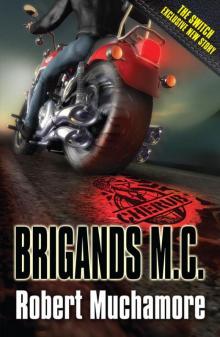 Brigands M.C.
Brigands M.C. Home
Home The General
The General New Guard
New Guard Lone Wolf
Lone Wolf Cherub: Guardian Angel: Book 14
Cherub: Guardian Angel: Book 14 Man vs. Beast
Man vs. Beast The Escape
The Escape Secret Army
Secret Army Henderson's Boys: Eagle Day: Book 2
Henderson's Boys: Eagle Day: Book 2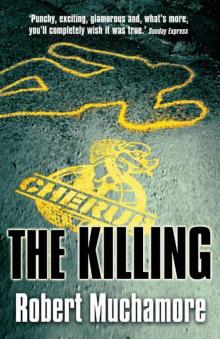 The Killing
The Killing Divine Madness
Divine Madness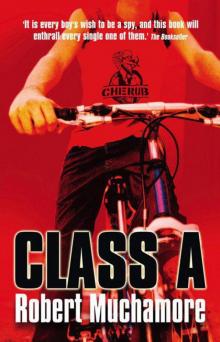 Class A
Class A The Sleepwalker
The Sleepwalker Henderson's Boys: Grey Wolves
Henderson's Boys: Grey Wolves Henderson's Boys: One Shot Kill: One Shot Kill
Henderson's Boys: One Shot Kill: One Shot Kill Maximum Security
Maximum Security The Prisoner
The Prisoner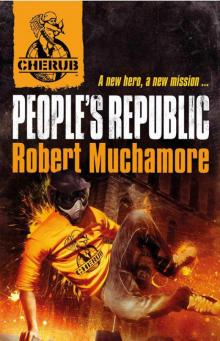 People's Republic
People's Republic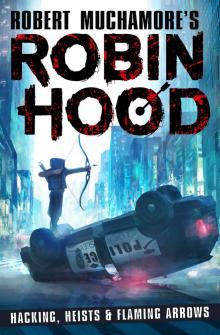 Robin Hood: Hacking, Heists and Flaming Arrows
Robin Hood: Hacking, Heists and Flaming Arrows Shadow Wave
Shadow Wave Mad Dogs
Mad Dogs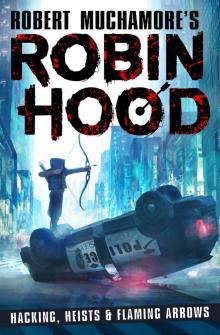 Robin Hood
Robin Hood Robin Hood 2
Robin Hood 2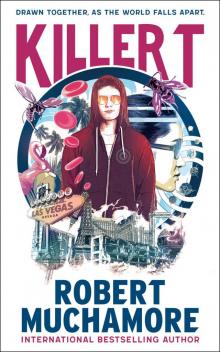 KILLER T
KILLER T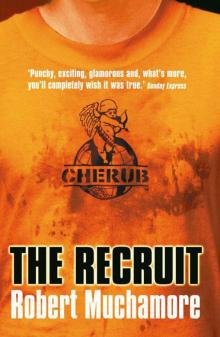 The Recruit
The Recruit Henderson's Boys: Scorched Earth
Henderson's Boys: Scorched Earth The Fall
The Fall Jet Skis, Swamps & Smugglers
Jet Skis, Swamps & Smugglers Black Friday
Black Friday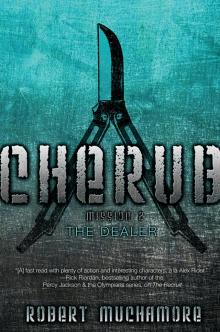 The Dealer
The Dealer CHERUB: Mad Dogs
CHERUB: Mad Dogs Scorched Earth
Scorched Earth Henderson's Boys: Eagle Day
Henderson's Boys: Eagle Day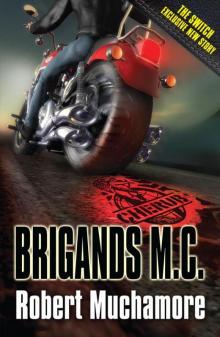 CHERUB: Brigands M.C.
CHERUB: Brigands M.C. CHERUB: Guardian Angel
CHERUB: Guardian Angel CHERUB: The Sleepwalker
CHERUB: The Sleepwalker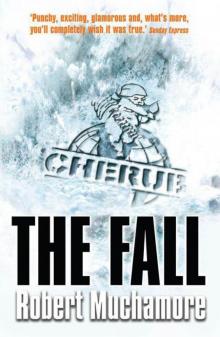 CHERUB: The Fall
CHERUB: The Fall Henderson's Boys: Secret Army
Henderson's Boys: Secret Army CHERUB: Dark Sun
CHERUB: Dark Sun CHERUB: Divine Madness
CHERUB: Divine Madness CHERUB: The General
CHERUB: The General New Guard (CHERUB)
New Guard (CHERUB) CHERUB: Shadow Wave
CHERUB: Shadow Wave CHERUB: Man vs Beast
CHERUB: Man vs Beast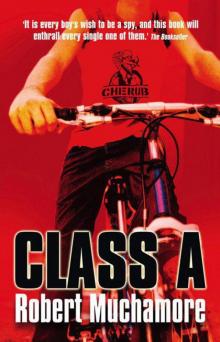 CHERUB: Class A
CHERUB: Class A Henderson’s Boys 4: Grey Wolves
Henderson’s Boys 4: Grey Wolves CHERUB: Maximum Security
CHERUB: Maximum Security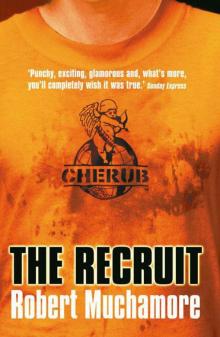 CHERUB: The Recruit
CHERUB: The Recruit CHERUB: Black Friday
CHERUB: Black Friday One Shot Kill
One Shot Kill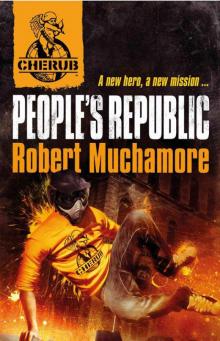 CHERUB: People's Republic
CHERUB: People's Republic